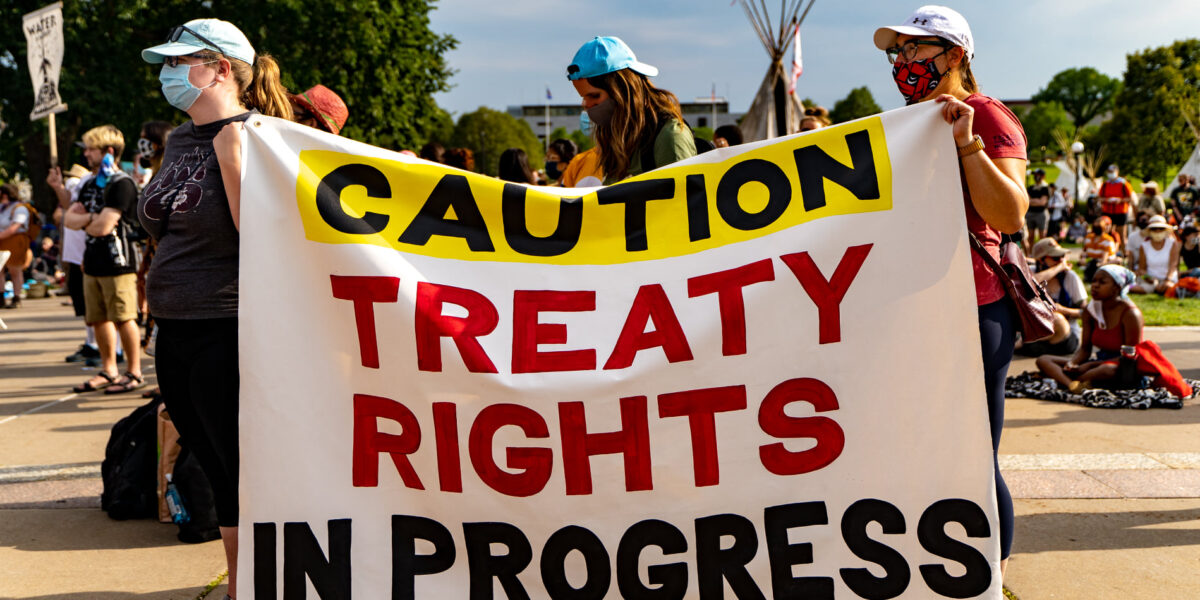The fight against Line 3 has reached the United Nations. Now, the U.S. must respond to allegations of Indigenous rights violations related to the pipeline construction. Tiffany Bui reports:
In late March, Indigenous-led organizations writing on behalf of the Anishinaabe people asked a United Nations committee to take action against the Enbridge Line 3 pipeline.
The tar sands pipeline crosses through treaty-protected lands and opponents say puts the environment at risk.Both the Giniw Collective and Honor the Earth argued that the Enbridge pipeline construction violated numerous rights of the Anishinaabe under an international convention against racial discrimination.
In a win for advocates, the UN Committee on the Elimination of Racial Discrimination wrote a letter to the U.S. requesting a response to these allegations.
Kate Finn is the executive director of First Peoples Worldwide, which helped bring the case in front of the UN. Finn said the letter is a key step in acknowledging that the pipeline construction has caused harm to the Anishinaabe.
“It really does plainly state these human rights violations,” said Finn. “And we can take this letter to businesses and to financial institutions and to insurers to say ‘here are the violations that are attendant to Enbridge’s pipeline.’”
The UN Committee asked the US to respond by October 15; as of the writing of this story, the U.S. had yet to respond publicly. A spokesperson for the United Nations said the committee can’t publicize states’ replies.
“We know through our work that the US isn’t required to respond publicly, so my assumption is that they won’t,” said Finn.
Still, the United Nations’ attention to Line 3 has raised awareness to an international level.
Keri Iyall Smith, a professor of sociology at Suffolk University, said it is not uncommon for Indigenous people in North America to turn to the United Nations after exhausting all their legal options at the local, state and federal level.
“I like the words that Walter Echo Hawk uses,” said Smith. “He calls it ‘the courts of the conqueror.’ And it’s very logical that it’s hard for Indigenous peoples to win in the courts of the conqueror, in the courts of the settler state. More frequently, what does happen is Indigenous peoples need to lean on that international support and international pressure to assert their rights.”
In some cases, the United Nations Declaration of Indigenous Rights recognizes more rights to Indigenous people than what is promised under the treaties. One example is the right to free, prior and informed consent, which dictates that tribes can give or withhold consent over any projects in their territories.
“Basically, Indigenous people in the U.S. would have, outside of the U.S. Constitution, anything that was explicitly spelled out in their treaties,” said Smith. “And I don’t think they would have envisioned something like free prior and informed consent at that time. [It] tended to be things like protecting the rights to gather and hunt in traditional places … But that’s not the same as free prior and informed consent, which really supports the autonomy of indigenous peoples, their political and social autonomy in these types of conversations.”
Line 3 began operating at the beginning of October; activists say they will continue fighting for Indigneous cultural and environmental rights.
Tiffany Bui reporting for Minnesota Native News.
Subscribe to Minnesota Native News in your favorite podcast app
- Indian Child Welfare Law Challenged at MN Supreme Court and Native Nations Impacted by Proposed SAVE ActTRANSCRIPT [sound element: flute music] HOST Marie Rock: This is Minnesota Native News. I’m Marie Rock. This week, the Minnesota Supreme Court heard arguments in a case that could reshape …
- The Sugarbush Tradition Continues in Minnesota’s Urban Areas, and Khayman Goodsky’s New FilmANCHOR Marie Rock: This is Minnesota Native News, I’m Marie Rock. This week, we hear about Minnesotans continuing the old tradition of sugarbush in urban areas. Plus, a look at …


 COVID Has High Positivity Rate Among Native Population in Minnesota
COVID Has High Positivity Rate Among Native Population in Minnesota